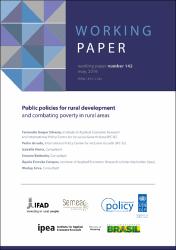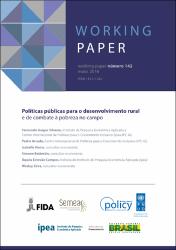Please use this identifier to cite or link to this item:
https://repositorio.ipea.gov.br/handle/11058/15610Full metadata record
| DC Field | Value | Language |
|---|---|---|
| dc.contributor.author | Silveira, Fernando Gaiger | |
| dc.contributor.author | Arruda, Pedro | |
| dc.contributor.author | Vieira, Izabelle | |
| dc.contributor.author | Battestin, Simone | |
| dc.contributor.author | Campos, Áquila Estevão | |
| dc.contributor.author | Silva, Wesley | |
| dc.date.accessioned | 2024-10-04T00:01:46Z | - |
| dc.date.available | 2024-10-04T00:01:46Z | - |
| dc.date.issued | 2016 | |
| dc.identifier.uri | https://repositorio.ipea.gov.br/handle/11058/15610 | - |
| dc.description.abstract | "Brazil has become a good example of public policies aimed at combating poverty and fostering rural development, or, in other words, promoting family farming. The country has even 'exported' some of its policies, notably the Programa Bolsa Família and the Programa de Aquisição de Alimentos (PAA—Food Acquisition Programme). This paper aims to present an evaluation of this set of policies, starting with their recent performance in terms of resources and beneficiaries, going through an identification of coverage indicators, and, finally, recovering studies and analyses that assess these policies. Specifically, for the monitoring and evaluation of rural development policies, the main source of information for this work were the chapters on the subject in the Institute of Applied Economic Research (Ipea) Social Policy Bulletin". (...) | en |
| dc.description.abstract | "O Brasil tornou-se exemplo de políticas públicas voltadas ao combate à pobreza e ao desenvolvimento rural, ou melhor, de fomento à agricultura familiar. O país tem, inclusive, "exportado"algumas dessas políticas, notadamente o Bolsa Família e o PAA. O presente texto tem por objetivo apresentar uma avaliação desse conjunto de políticas, iniciando-se pelo desempenho recente em termos dos respectivos recursos e beneficiários, passando pela identificação de indicadores de cobertura e, por último, resgatando estudos e análises que avaliam tais políticas. No caso do acompanhamento e da avaliação das políticas voltadas para o desenvolvimento rural, a principal fonte de informação foram os capítulos sobre o tema no Boletim de Políticas Sociais do Ipea. Seguiram-se, em grandes linhas, suas principais conclusões: a Reforma Agrária vem perdendo espaço, notadamente o instrumento da desapropriação". (...) | pt-br |
| dc.language.iso | en | |
| dc.title | Public policies for rural development and combating poverty in rural areas | en |
| dc.title.alternative | Políticas públicas para o desenvolvimento rural e de combate à pobreza no campo | pt-br |
| dc.type | Working Paper | |
| dc.rights.holder | International Policy Centre for Inclusive Growth | |
| dc.rights.holder | United Nations Development Programme | |
| dc.location.country | Brasil | |
| dc.description.physical | 60 p. : il. | |
| dc.rights.type | Licença total exclusiva | |
| dc.rights.license | O texto e dados desta publicação podem ser reproduzidos desde que as fontes sejam citadas. Reproduções com fins comerciais são proibidas. | |
| dc.subject.keyword | Public policies | |
| dc.subject.keyword | development | |
| dc.subject.keyword | combating poverty | |
| dc.subject.keyword | rural areas | |
| ipea.access.type | Acesso Aberto | |
| ipea.researchfields | N/A | |
| ipea.classification | Agricultura, Pecuária e Pesca | |
| ipea.classification | Desenvolvimento Social | |
| ipea.classification | Economia. Desenvolvimento Econômico | |
| Appears in Collections: | Publicações do IPC-IG | |
Files in This Item:
| File | Description | Size | Format | |
|---|---|---|---|---|
| en_WP142_Public_policies_for_rural_development.pdf | 3.7 MB | Adobe PDF |  View/Open | |
| pt-br_WP142PT_Politicas_publicas_para_o_desenvolvimento_rural.pdf | 3.58 MB | Adobe PDF |  View/Open |
Items in DSpace are protected by copyright, with all rights reserved, unless otherwise indicated.

